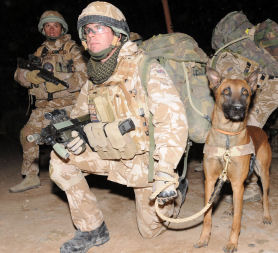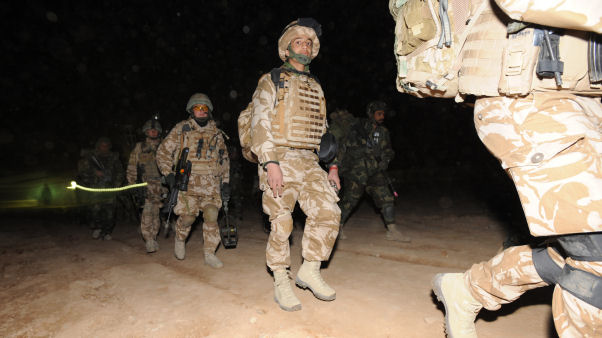Afghan war: ambush strategies to beat the Taliban
In a close-up account from behind enemy lines in Afghanistan, video journalist Vaughan Smith joins the Grenadier Guards to reveal the ambush strategies UK troops are using to beat the Taliban.
A clandestine operation carried out by the Reconnaissance Platoon of the Grenadier Guards took place in northern Helmand province during the initial stages of Operation Moshtarak.
Channel 4 News had unique access to the strategic operations and preparations behind the offensive.
Video journalist Vaughan Smith, a former army captain, was embedded with the Grenadier Guards in the weeks leading up to Operation Moshtarak in February 2010, based in an old British fort, now called Camp Shawqat, in the central Nad-e-Ali district.
“The whole idea is basically we’re harassing them to put the shoe on the other foot for once.” Cpt Jim Young
Captain Jim Young, the officer who led the platoon, confirmed that his men had “65 confirmed enemy kills” in the four months leading up to Moshtarak.
Channel 4 News filmed the troops as they lay in wait for Taliban insurgents. British soldiers worked side by side with their counterparts from the Afghan National Army.
At least three enemy insurgents died in the ambush which was intended to destabilise the Taliban.
In the next phase of the operation the Grenadiers with an attached company from the Royal Welch Regiment then “cleared” the village of Kushal Kalay of roadside bombs as part of the “shape, clear, hold and build” objectives of Moshtarak.
“The whole idea is basically we’re harassing them to put the shoe on the other foot for once,” says Cpt Young as they wait for Taliban insurgents. “Because all they have to do is put an IED down and they can focus us in one area”.

Operation Moshtarak
In Dari Persian the name of the offensive translates to Operation "together".
It was the biggest land invasion of the war in Afghanistan for British forces and their allies.
In February 2010 a force of up to 15,000 troops was mobilised under Moshtarak to take significant areas of Helmand Province under control.
A main target was to storm Marja, a town of 80,000 people, and a Taliban stronghold in the south of the country.
IED threat
Roadside bombs are a constant threat to British soldiers. In one incident during Vaughan Smith’s four-week period embedded with the British Army, three Afghan soldiers were killed by a roadside bomb. One British and two Afghan soldiers were also lightly wounded.
He said: “The threat had changed since the last time I was there. Now it is all about the dangers of improvised explosive devices (IEDs).
“Radio-controlled and so called ‘command wire’ mines are common now, but the Taliban are constantly adapting their bomb making techniques to avoid detection. These days insurgents are using less metal in their IEDs – which means British troops have to use more sophisticated technology to find and destroy them.”
“Each cost just a few pounds to make – the operation to remove one took eight men, three painstaking hours and millions of pounds worth of equipment.” Vaughan Smith
“Each cost just a few pounds to make – the operation to remove one took eight men, three painstaking hours and millions of pounds worth of equipment.”
“When we find IEDs we can neutralise them to make it safe for our guys to come through,” says Sergeant Harry French of the 11 Explosive Ordnance Disposal Regiment. “It’s a risky business, but we have philosophies and principles and SOPs which reduce that risk as much as we can do.
“SOPs are basically written in blood over years in Northern Ireland, people who have been killed, things we’ve learned from previous devices about terrorist tactics.”

‘Thinking man’s war’
Vaughan Smith, who often found himself under fire, explained: “Afghanistan has become a thinking man’s war. While I was there complex tactics were used. Men would sometimes fires shots into an empty field. It was done so that the Taliban would return fire and expose their positions. But done in a way to ensure no civilian casualties.”
The British Fort, the main base for the Grenadier Guards, is a relic from the military adventures of the 1880s. The men in charge are Lieutenant Colonel Roland Walker, and his Sergeant Major Ian Farrell – at the forefront of the British counter-insurgency effort.
“It’s a high price – if you get it wrong and if you’re caught out and if you turn into being the hunted then it can be pretty frightening.” Lt Col Roland Walker
“A defensive operation in a counter insurgency is about taking that away from the insurgents that they can’t afford to lose, which simply put is control of the population.” Lt Col Walker said.
“It’s exhilarating, truly exhilarating.” he said of his five months in charge in Afghanistan at the time of filming.
“It’s a high price – if you get it wrong and if you’re caught out and if you turn into being the hunted then it can be pretty frightening. But if you can personalise it and you can lay the traps and you can draw them in, then yes, it’s very exhilarating.”
Embedded Royal Anglian Regiment
During his time in Afghanistan, Vaughan Smith also travelled with the Royal Anglian Regiment.
Vaughan Smith said: "They leave their base at 10am. The first man clears a route with a mine detector and they all follow his path.
"The hazards of Taliban Improvised Explosive Devices - IEDS - is so great that when they are fired on, they still have to stick to this path and they can't run for cover.
Smith says later the British soldiers head out again knowing the Taliban are waiting for them.
"The soldiers plan to kill the sniper using a shoulder-mounted rocket - known as a Javelin," he adds.
Smith said the Taliban response was much stronger than they expected. They start getting shot at from several different directions but all the men of two section arrived back safely. They went out on patrol again the next day.
Daniel Monks said: "I didn't think I would be doing this out here. I was looking forward to coming out here and maybe chilling out a bit! But it's not like that. It's got loads of IEDs and mines. The threats are even higher than before."
With the village cleared – the Grenadier Guards built compounds over night. The next day, the locals were invited for a meeting hosted by the district governor Habi Bullah.
“This is the beginning of governance being reasserted into this area,” Lt Col Walker said. “That’s what this is about. Much though I’d like to think it’s a straightforward military operation, it’s about the governor getting close to his people.”
Within the week, most of the soldiers will have left, to be replaced by the Afghan Police. The success of Operation Moshtarak in Kushal Kulay will be measured in years, not days.
Capture of Taliban leaders
A rebellion like the Taliban's insurgency in Afghanistan is rather like the smouldering embers of a forest fire, writes author Stephen GreyDiscontent and grievance are the fuel, and a rebel group's ideology, organisation and leadership breathe the wind that turns the embers into roaring flames.
The twin strategy of a Nato's campaign in the region, as explained by top commanders, mirrors that metaphor.
On the one hand are conventional operations led by ground troops and development experts.
Their much-publicised campaign - exemplified by Operation Moshtarak - is targeted ultimately at influencing the minds of the people in those war torn districts.
But the disclosure of the stunning capture of the no. 2 of the Afghan Taliban's Pakistan-based leadership, Mullah Abdul Ghani Berader is part of the covert but equally important plank of the war.
As one US general in Kabul told me a while back: "Don't be deceived by all the hearts and minds and all the open stuff. As big a part of the war is what we call the manhunt: tracking down and getting the bad guys."
Smith, who first went to Afghanistan with the Grenadier Guards in September 2007, added: “It was a different war back then. In 2007 it was aggressive and mobile.
“This time I was surprised to see how different things looked. The army now has a clear idea of what it wants to do. That is, deny them the thing that the Taliban need most – control of the civilian population.”
“The Afghan people have seen fighting for too long. The country has been at war for 40 years. All they want now is peace.”
Read more from independent video journalist Vaughan Smith at: Frontline